By: Hazem Badr
Send to a friend
The details you provide on this page will not be used to send unsolicited email, and will not be sold to a 3rd party. See privacy policy.
There’s a standard recycling practice in many countries: households sort their garbage in different categories before discarding it, with separate containers assigned for solid waste of different types, and others for organic waste.
But in Egypt, households still produce mixed waste. This makes sorting it, prior to recycling, one of the tasks of garbage collectors — a task which exposes them to serious health risks.
Still, garbage collectors in Cairo objected to a recent decision by the city’s governor to set up a system encouraging citizens to sort and sell their own garbage.
The setting up of kiosks is a new approach that was piloted in some districts in Cairo last March. The idea is to encourage people to sort their own garbage, sell salvaged solid materials through these kiosks, and donate the money to charities of their choice.
But the city’s garbage collectors depend on selling salvaged waste material for their livelihoods, and so they objected to the decision after a meeting held on 13 April with Shehata al-Moqadis, the head of the Garbage Collectors union. They also demanded an increase in the cost of collecting garbage from houses in the districts where these kiosks are already established — from five to 30 Egyptian Pounds per month (0.25 US$ and 1.5 US$, respectively).
Most of Cairo’s garbage collectors live in Ezbet El-Zabbaleen quarter, otherwise known as Garbage Collectors village. It is located along a road leading to Mokattam neighbourhood, where vehicles unload tons of garbage collected by the quarter’s residents prior to their sorting, processing, and recycling.
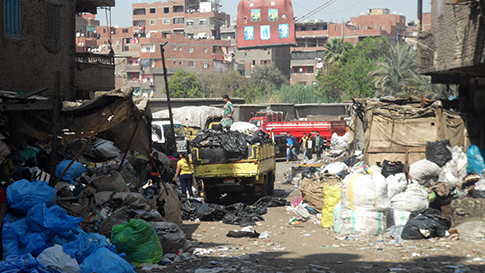
Once you set foot in the quarter, you’re met by an offensive smell and can’t help but wonder how residents can adapt to it.
“Just like I cannot write like you, you cannot tolerate this smell like I do,” said Magdy Mosaad, one of the garbage collectors, proud of his ability to tolerate it as I pinch my nose so I can talk. “It is my profession, from which I earn my living.”
Mohammed Bakri, 57, is one of the workers who separates solid materials, such as plastic and glass, to be sent to factories prior to recycling. Organic waste is deposited in landfills managed by the city.
“This is my profession, I do not know anything else, and every occupation has its own dangers,” Bakri said as he swaddled a cloth around a hand wounded while sorting garbage.
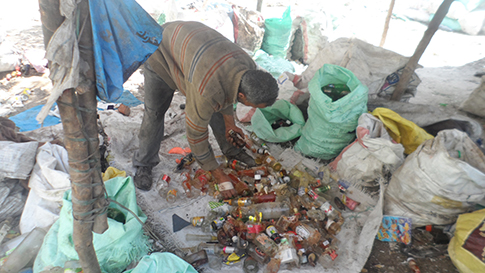


I later discovered that Bakri had been infected with the hepatitis C virus — and yet, he did not wish for a different profession. He had reached an age where finding another job would be difficult. “In this profession, I have a daily income of 80 [Egyptian] pounds (about 4 US$), which I spend on my children,” he told me with a smile of contentment. “May God preserve it for us and keep away the garbage kiosks.”
The city’s idea of setting up kiosks is also rejected by Sa’eed Kerolos, who works in the garbage sorting profession with his wife and two daughters. Kerolos says he does not care about the health risks that may affect his family.“The government’s plan started with 10 kiosks, with three people working in each [of them], providing 300 jobs,” he said. “On the other hand, it will affect thousands of families [already] working in this field.”
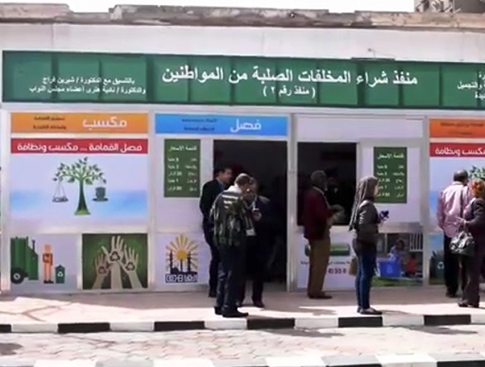


Al-Moqadis expects the idea to fail. He believes it will make Cairo more polluted. “What would motivate me to collect garbage if I know it does not contain the solid materials I use?” he asked, pointing to tons of glass he salvaged.
“This smell, which you cannot tolerate while you are here for a short time to finish your report, would be in all the streets of Cairo if we decided to strike,” he added confidently.
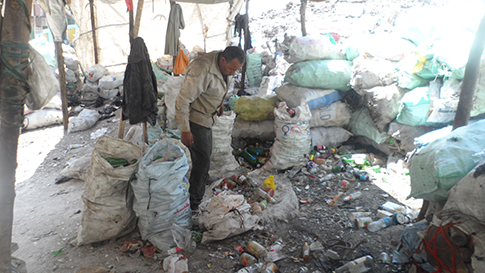


According to Islam Jamal-Eddin, professor at the Institute of Environmental Studies and Research of Ain Shams University, the problem is not just the smell.
There are also toxic gases, he said, which can infiltrate the air as a result of the decomposition of organic waste — methane, for example, nitrogen oxides, hydrogen sulphide and carbon dioxide.
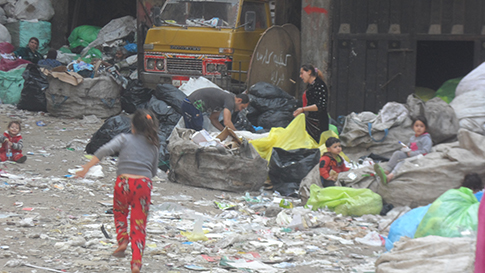


Egypt needs an integrated waste recycling system, according to Jamal-Eddin.
He believes that Shehata al-Moqadis and his fellow garbage collectors have a role to play to avoid a situation where the city’s garbage is left uncollected. At the same time, Jamal-Eddin believes an integrated system should be designed in a way that does not make garbage collectors vulnerable to the communicable diseases they can contract while sorting the garbage.
He points out that most workers are infected with the hepatitis C virus because they come in direct contact with medical waste, such as discarded needles that may contain blood infected with the virus.
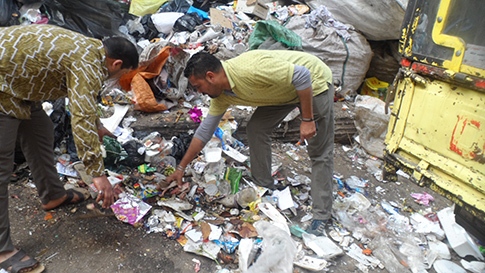


This piece was amended on September 7th, 2017, to change hydrogen 'sulphate' to hydrogen sulphide in the 17th paragraph. We have since learnt that there is nothing called hydrogen sulphate.
This piece was originally published by SciDev.Net’s Middle East and North Africa desk.













